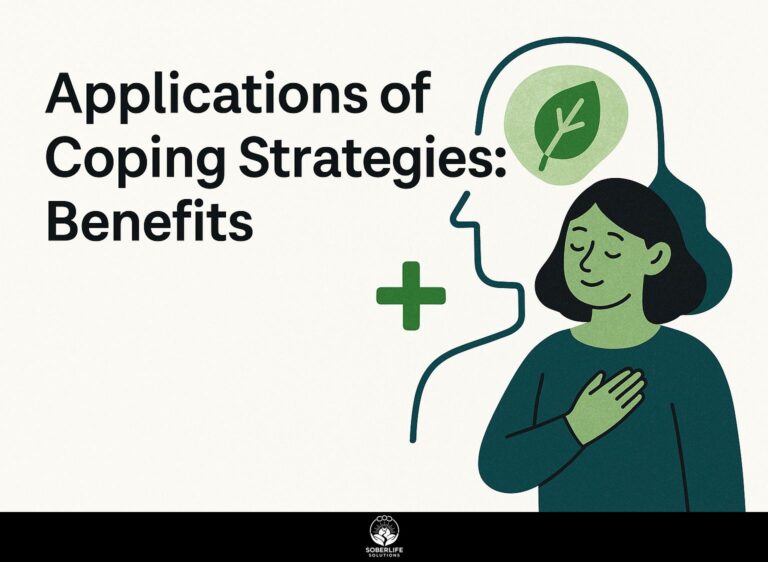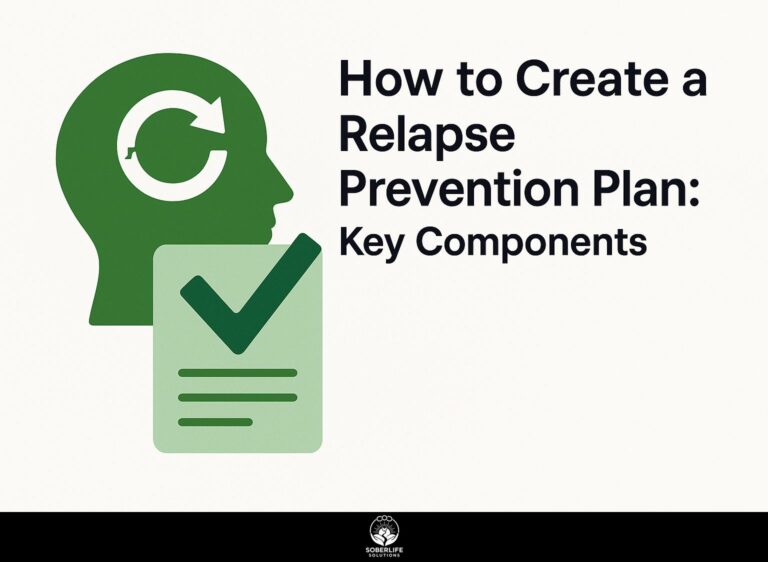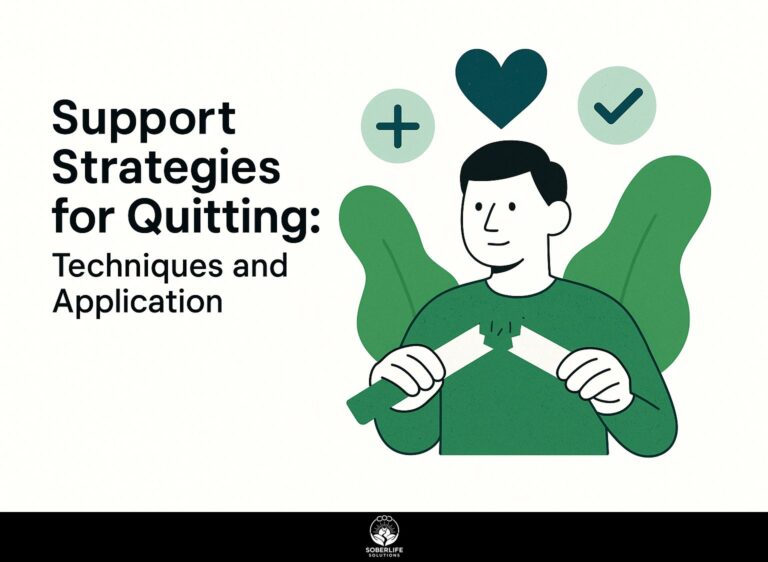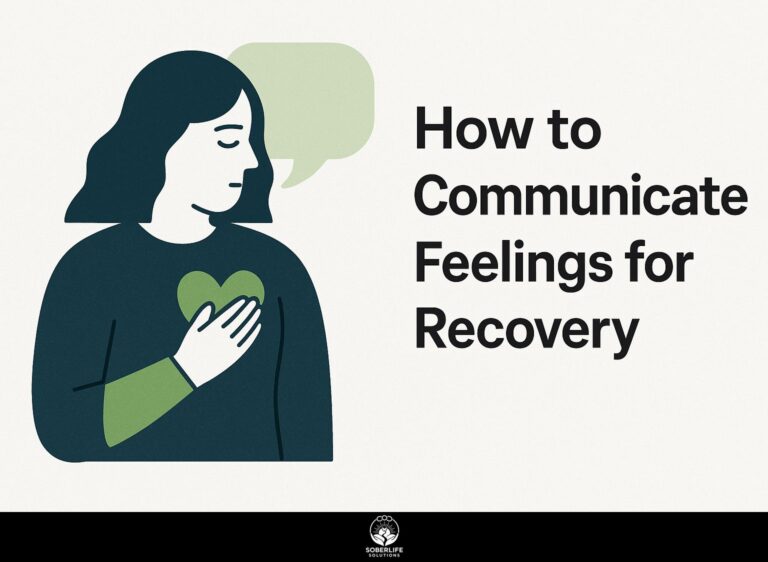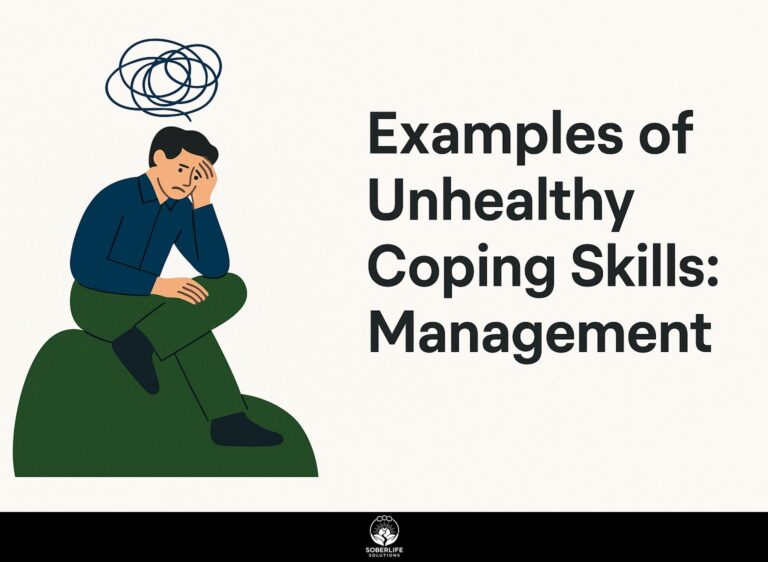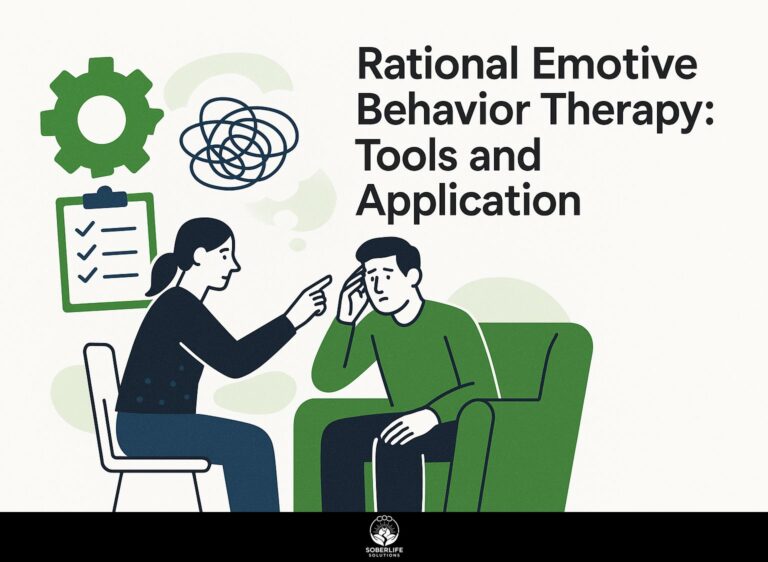Meditation: Techniques and Impact on Alcoholism Recovery
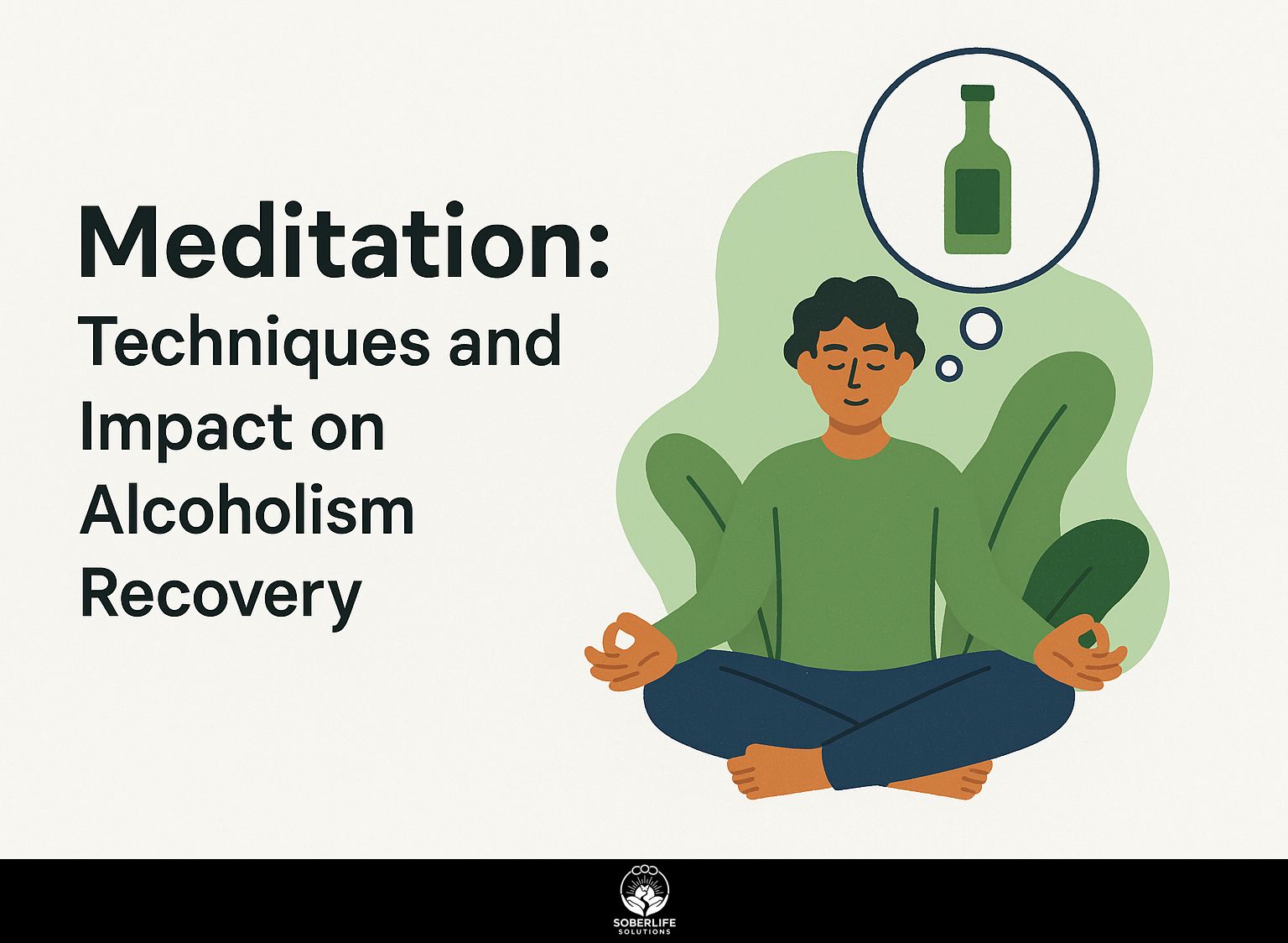
Struggling with alcohol dependence? Meditation, particularly mindfulness meditation, offers powerful techniques for relapse prevention and overcoming substance use disorders. Trying different meditation methods can help with healing and improve how you handle emotions and lower stress. This article explores how meditation can positively affect recovery from alcoholism, offering practical advice and methods to build strength and improve health during your recovery.
Key Takeaways:
Definition and Purpose
Meditation is the practice of focused attention and awareness. It helps improve mental clarity and emotional stability, especially useful in therapy groups for substance use disorders.
Meditation supports strength and aids people in handling urges during recovery. A study showed that 86% of people said their ability to control emotions improved after a structured mindfulness program.
Apps like Headspace and Insight Timer offer guided sessions for recovery, including breathing exercises and body scans. Many addiction treatment centers now include meditation as part of their curriculum, acknowledging its role in reducing relapse rates and promoting long-term wellness. Recent research from the American Psychological Association indicates that mindfulness meditation is a research-proven way to effectively support these outcomes.
Regular practice can significantly improve coping strategies, leading to sustainable recovery outcomes.
Historical Context
Historically, mindfulness meditation has roots in ancient traditions but gained traction in the West through programs like Mindfulness-Based Stress Reduction pioneered by S. Bowen in 2007.
Since then, meditation has evolved significantly in therapeutic settings. Notably, studies from institutions like Harvard and Johns Hopkins have demonstrated its effectiveness in reducing anxiety and depression.
This has led to the integration of mindfulness practices in recovery programs, such as the Mindfulness-Based Relapse Prevention (MBRP) developed to support individuals in addiction recovery. Worth exploring: Virtual recovery groups as a trending support method, that complement these practices.
By mixing meditation with cognitive behavioral methods, participants often say they have better self-awareness and coping skills, which are important for long-term change.
Meditation Techniques
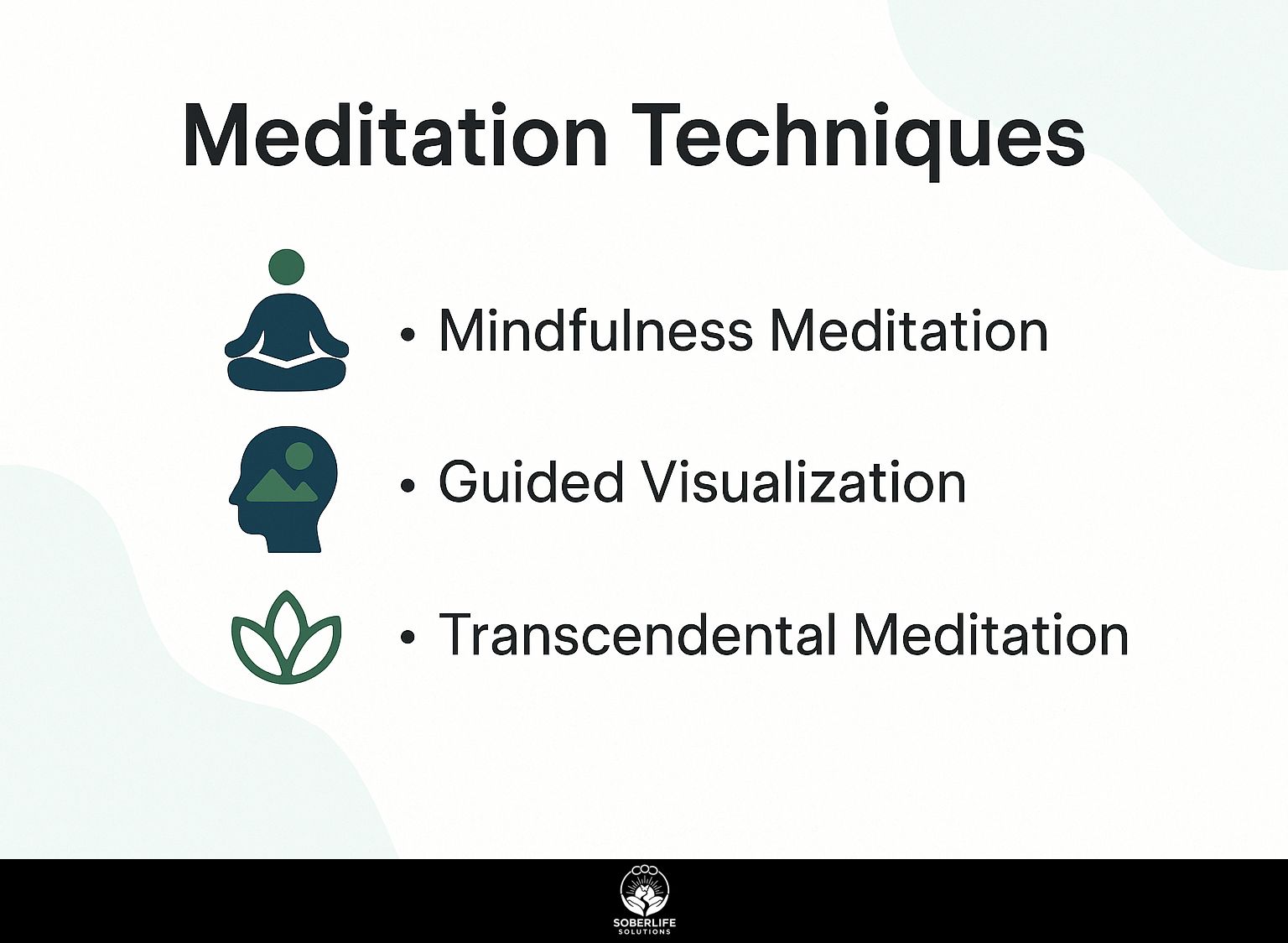
Different meditation methods suit various preferences and needs, each playing a distinct role in helping people recover from alcohol dependence. To explore specific techniques and their benefits, our expert opinion on mindfulness and meditation in addiction recovery provides valuable insights.
Mindfulness Meditation
Mindfulness meditation focuses on cultivating present-moment awareness, significantly reducing stress and anxiety in participants recovering from substance use disorders.
To practice mindfulness meditation, find a quiet space and sit comfortably. Start by closing your eyes and breathing deeply, paying attention to how each breath feels.
Set a timer for 5 to 10 minutes. If your mind wanders, acknowledge the thoughts without judgment and gently return your focus to your breath.
Studies indicate this practice can lower cortisol levels by 30%, alleviating stress symptoms. Consistency is key; aim for daily sessions to reap long-term benefits, enhancing your emotional well-being as you progress in recovery. To further understand the link between mindfulness and reduced stress, an expanded context provided by UC Davis highlights how meditation can effectively lower stress hormones.
Guided Visualization
Guided visualization is a meditation technique that uses imagination to create calming mental images, supporting emotional regulation and enhancing treatment history narratives.
In therapy for alcohol dependence, practitioners often use guided visualization to help individuals imagine a healthier lifestyle, free from alcohol.
For example, a therapist might lead a session where clients visualize themselves enjoying social events without drinking, or relaxing in nature, reinforcing positive coping mechanisms.
Apps like Headspace offer visualization exercises specifically designed for stress relief, providing accessible support. Creating specific scripts for certain situations can help improve the ability to resist cravings.
Transcendental Meditation
Transcendental Meditation uses a specific phrase to aid in deep relaxation and reduce stress, making it an effective technique in therapy groups for dealing with addiction.
Practicing Transcendental Meditation is typically done for 15 to 20 minutes, twice daily. To start, find a quiet space and sit comfortably.
Close your eyes, take a few deep breaths, and then silently repeat your mantra. This process aids in reaching a calm state and improves control over emotions.
Studies indicate that participants often experience reduced cravings and anxiety levels; for instance, a 2014 study published in the journal ‘Addictive Behaviors’ reported a significant decrease in substance use among those who practiced TM regularly.
This method creates calmness and strengthens mental endurance.
Benefits of Meditation in Recovery
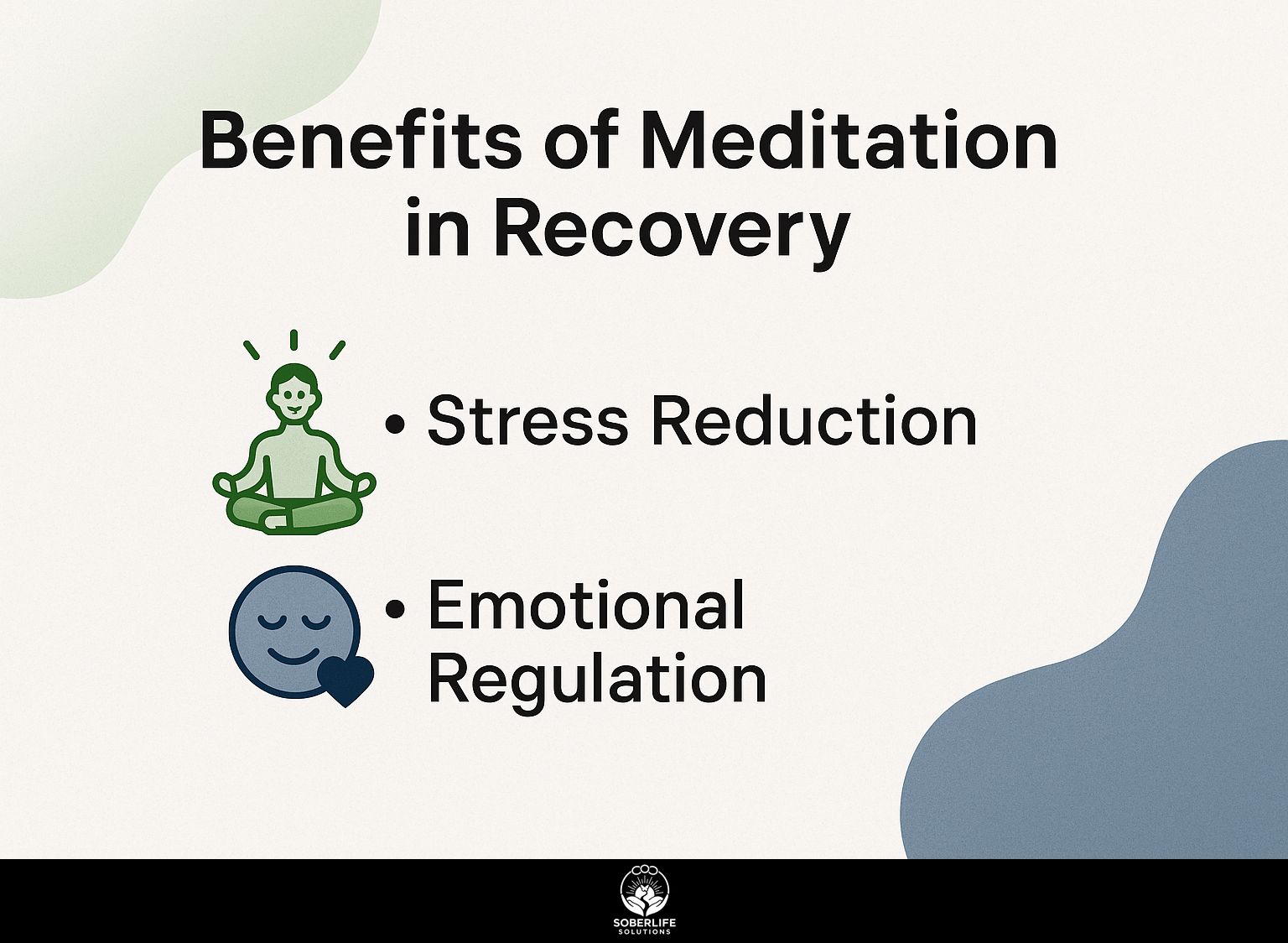
Meditation offers many benefits for recovering from alcohol addiction. It helps reduce stress and manage emotions more effectively. As mentioned in our guide on Mindfulness and Meditation: Techniques and Benefits in Addiction Recovery, incorporating mindfulness practices can enhance these benefits significantly.
Stress Reduction
Meditation has been shown to significantly lower stress, with studies indicating that regular practice can reduce cortisol levels by 25-30% in participants dealing with substance use disorders.
One effective approach is mindfulness meditation, which focuses on being present in the moment. A practice could start with just five minutes daily, sitting in a quiet space and concentrating on your breath.
Studies have found that even a short, consistent routine can lead to measurable reductions in anxiety. Apps like Headspace and Calm provide beginner-friendly guided sessions.
Research shows that people who meditate often have fewer signs of depression and anxiety, highlighting the importance of adding meditation to your daily habits.
Emotional Regulation
Meditation helps improve control over emotions, allowing people to handle anxiety and depression symptoms more effectively, which is important for those recovering from alcohol addiction.
In recovery programs, participants often talk about a significant change in how they feel emotionally. For instance, Anna, who struggled with anxiety, shared, “After incorporating mindfulness meditation, I find it easier to pause and reflect instead of reacting impulsively.”
Techniques like focused breathing or body scans can significantly improve self-awareness and coping strategies.
Programs like Headspace or Calm provide guided meditations that focus on managing emotions, helping users achieve a more stable mindset.
Ensuring a daily practice of just 10 minutes can yield substantial benefits over time.
Research on Meditation and Alcoholism
Research increasingly shows that meditation methods, especially mindfulness-based relapse prevention, are effective in treating alcohol addiction.
Studies Supporting Effectiveness
Many studies, like one that looked at interleukin-6 levels in people recovering from alcoholism, show that regularly practicing meditation can reduce relapse rates by up to 50%.
For instance, a randomized controlled trial involving 300 participants showed that those practicing mindfulness meditation had significantly reduced anxiety and depression levels compared to a control group.
The study, published in the Journal of Substance Abuse Treatment, revealed a marked improvement in participants’ coping strategies after 12 weeks.
A meta-analysis of six studies on yoga and meditation highlighted their role in enhancing emotional regulation and stress relief, further supporting their effectiveness in addiction recovery. As the American Psychological Association notes, mindfulness meditation is a research-proven method for reducing stress and boosting emotional well-being.
These findings suggest including meditation in recovery programs could greatly help individuals looking for lasting change.
Case Studies and Personal Accounts
Real-life examples show how meditation helps people recover from alcohol addiction, offering detailed information about their experiences.
For instance, Sarah, a 32-year-old recovering alcoholic, shared how daily meditation helped her manage cravings. She practiced mindfulness meditation for 10 minutes each morning, using the Headspace app to guide her. This routine enabled her to stay present and reduce anxiety.
Similarly, John, who struggled with dependency for years, found solace in transcendental meditation. By dedicating 20 minutes twice daily, he reported feeling more at peace and better equipped to handle stressors.
Both accounts show how adding meditation to recovery can build strength and emotional balance.
Integrating Meditation into Recovery Programs
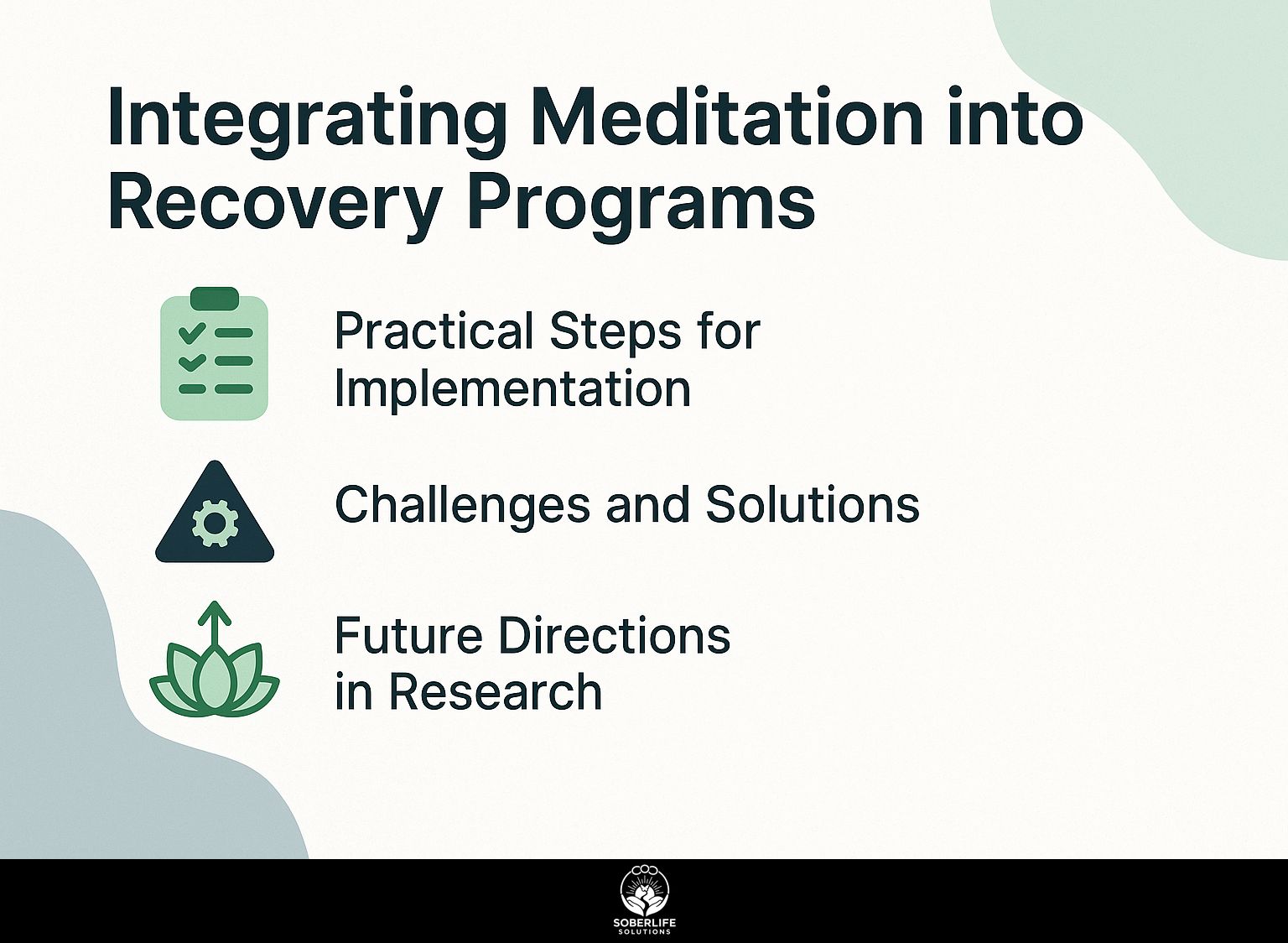
Adding meditation to recovery programs can improve treatment results, but it needs thorough planning and attention to different obstacles. For an extensive analysis of this trend, our comprehensive study on using positive affect to boost recovery outcomes offers valuable insights.
Practical Steps for Implementation
To successfully use meditation in recovery programs, practitioners can follow five main steps, such as teaching staff mindfulness techniques and planning regular sessions.
-
Begin by educating staff on the principles of mindfulness and meditation through workshops or online courses, such as those offered by the Center for Mindfulness or Headspace for Work.
-
Next, create a designated serene space for meditation sessions within the facility, equipped with comfortable seating and calming elements.
-
Arrange group meditation sessions a few times each week. Use apps like Calm or Insight Timer for guided meditation.
-
Encourage participants to integrate short daily mindfulness exercises, like deep breathing or body scans, at home.
-
Regularly evaluate the program’s effectiveness through participant feedback and adjust the approach as needed.
Challenges and Solutions
While integrating meditation presents challenges, such as staff resistance and participant engagement, effective solutions can promote successful implementation.
One way to deal with employees not wanting to participate is to offer thorough training sessions that explain how meditation can help both attendees and staff. Programs like Mindful Schools have shown teachers how to use mindfulness in classrooms, leading to more support from faculty.
To improve participant involvement, combine meditation with interactive methods like guided group sessions or use technology such as meditation apps. Programs using Headspace showed increased retention rates among participants, demonstrating how effective changes can create a helpful setting for meditation in recovery.
Future Directions in Research
Further studies should look into the lasting impacts of mindfulness practices on different substance use disorders to improve treatment approaches.
Researchers could look into how mindfulness can be included in outpatient programs for people dealing with alcohol dependence and opioid use disorder.
Utilizing validated tools like the Mindfulness Attention Awareness Scale (MAAS) can help track participants’ progress.
Long-term research projects that track recovery rates over an extended period will help determine how effective these practices are in the long run.
Studying changes in the brain with imaging techniques can help us understand how mindfulness affects cravings and emotions. This could make mindfulness an important part of treatment plans.
Frequently Asked Questions
What is meditation?
Meditation is a practice that involves training the mind to achieve a calm and clear state through techniques such as focusing on the breath, repeating a mantra, or visualizing peaceful images.
How can meditation help with alcoholism recovery?
Meditation can help with alcoholism recovery by reducing stress and promoting relaxation, which can aid in managing cravings and reducing the risk of relapse. It can also improve overall mental and emotional well-being, which can support the recovery process.
What are some effective meditation techniques for alcoholism recovery?
Some effective meditation techniques for alcoholism recovery include mindfulness meditation, loving-kindness meditation, and body scan meditation. These techniques can help individuals to stay present, develop self-compassion, and become more aware of their physical and emotional state.
Is meditation a substitute for professional treatment for alcoholism?
No, meditation is not a substitute for professional treatment for alcoholism. While it can be a beneficial tool in the recovery process, it should not be used as the sole form of treatment. Seeing a licensed therapist or counselor is important for addressing the underlying causes of alcoholism.
Can anyone practice meditation for alcoholism recovery?
Yes, anyone can practice meditation for alcoholism recovery. It does not require any specific beliefs or religious affiliations. It is a non-religious activity that can be adjusted to fit personal requirements and choices. If someone has experienced mental health problems, they should talk to a healthcare provider before beginning meditation.
How long does it take for meditation to show its impact on alcoholism recovery?
The impact of meditation on alcoholism recovery can vary for each individual. Some may experience a noticeable change in their cravings and overall well-being after a few weeks of consistent practice, while others may take longer. Being patient and consistent in meditation is important for experiencing its healing benefits.

